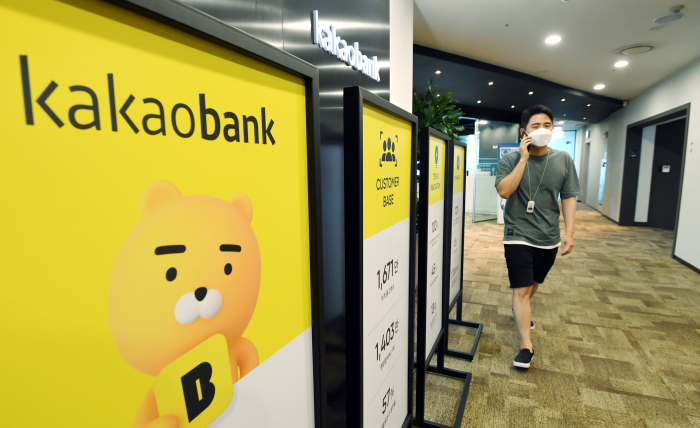Korea Post nets nearly $1 bn from KakaoBank block sale
The state-run body cashed out most of its stake in KakaoBank for tenfold return
By Sep 02, 2021 (Gmt+09:00)
LG Chem to sell water filter business to Glenwood PE for $692 million


Kyobo Life poised to buy Japan’s SBI Group-owned savings bank


KT&G eyes overseas M&A after rejecting activist fund's offer


StockX in merger talks with Naver’s online reseller Kream


Mirae Asset to be named Korea Post’s core real estate fund operator



Korea Post has netted slightly over 1 trillion won ($861 million) from the block sale of its shares in South Korea's largest internet-only lender KakaoBank, sending its share price almost 8% lower on Thursday.
The South Korean state-run body sold a 2.9% stake in KakaoBank for 1.09 trillion won ($943 million) after Wednesday's market close, according to investment banking sources on Sept. 2. After the block deal, its ownership has declined to 0.33%.
Through the block deal, Korea Post offloaded 13.7 million shares in the banking platform as it had planned, managed by Citigroup Global Markets. Bids outnumbered offers five to one.
Korea Post's savings arm had invested 12 billion won in KakaoBank as one of 11 founding shareholders in October 2015. As the only state-run founding shareholder, it achieved about a tenfold return from the pre-IPO investment in six years.
Last month, KakaoBank made a strong debut on the Korea Exchange to become the country's most valuable lender. Its initial public offering drew the largest-ever amount of bids from institutional investors for a domestic listing, worth 2,500 trillion won and was priced at the top of its guidance range at 39,000 won.
For the IPO, the company sold only new shares.
On Thursday, its shares closed down 7.7% at the session low of 81,900 won in their heaviest trade in two weeks. The benchmark Kospi index dropped 0.97%.
PRE-IPO INVESTORS
With its parent company Kakao Corp. and Korea Value Asset Management Co. controlling a combined 55% of the banking platform, other pre-IPO investors include Kookmin Bank, Korea Investment Holdings, Chinese tech giant Tencent Holdings and eBay Korea.
Private equity firms TPG Capital and Anchor Equity Partners each have about a 2% stake in KakaoBank.
Game developer Netmarble Corp., among the founding shareholders, has already cashed out about half of its stake in KakaoBank for a 14-fold return. According to its regulatory filing, it sold 6 million shares in the internet lender for 430.1 billion won during market hours on Aug 10. which reduced its holding to 1.94%.
Korea Post's block sale came a week ahead of KakaoBank's inclusion on the Kospi 200 index, or among the top 200 stocks on the country’s main bourse, on Sept. 9.
Krafton Inc., the developer of the popular online game PlayerUnknown’s Battlegrounds (PUBG), will also join the index simultaneously, taking the place of JW Pharmaceutical Co. and Lock & Lock Co., a plastic container manufacturer.
REASON FOR BLOCK SALE
The block sale seems to be aimed at cutting the proportion of venture capital investments which have increased sharply, alongside the surge in KakaoBank shares.
The value of alternative assets at Korea Post's savings arm had nearly doubled to 6 trillion won as of the end of March of this year, versus 3.2 trillion won in 2016.
They accounted for 7.2% of its total assets as of the end of March, compared with 5% in 2016 and surpassed the 5.2% of domestic equities during the same period.
The proportion of alternatives must have risen further after KakaoBank's share price more than doubled its IPO price of 39,000 won as of Wednesday's close.
Unlike private equity and venture capital investment managers, the alternative investment team which had carried out the pre-IPO investment in KakaoBank will not receive massive bonuses in proportion to the heavy profits from the divestment.
"But they are eligible for performance bonuses in accordance with the government officials act," said a Korea Post official.
Last year, Korea Post's savings unit, with 83 trillion won in assets under management, logged an average 4.29% return on investments, compared with the National Pension Service's 2020 return of 9.7%.
(Updated on Sept. 3 to add details about Korea Post)
Write to Jong-woo Kim at jongwoo@hankyung.com
Yeonhee Kim edited this article.
-

-
 IPOsTencent, Korea Value poised to see sixfold return from KakaoBank
IPOsTencent, Korea Value poised to see sixfold return from KakaoBankJul 27, 2021 (Gmt+09:00)
3 Min read -
 IPOsKakaoBank's IPO draws $2 tn in bids despite valuation debate
IPOsKakaoBank's IPO draws $2 tn in bids despite valuation debateJul 22, 2021 (Gmt+09:00)
4 Min read


